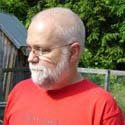Checking in again, Chris. Sorry to have let this dropped. As a poet, I have to believe that the actual leaf "is more real" than the abstracted leaf. I early on adopted Blake's hatred of abstraction. I'd argue that it's a species of abstraction that got our country into this stupid, bloody war in Iraq.
Philosophical Investigations
Christopher Robinson & Joseph Duemer read Wittgenstein's Philosophical Investigations
3.27.2003
3.05.2003
Sidestepping Materialism & Idealism is one of the things that makes Wittgenstein so austere. I appreciate the rigor but let's talk about abstraction. When we ab-stract the general picture of all leaves the resulting image is certainly "real" & has an ontological relationship to a particular leaf. It is the nature of that relationship that interests me. Blake wrote that "genius is in minute particulars" & by genius I think he meant something like life. Am I only making a commonsense distinction between the abstract image & the particular object? I've always had the sense that the chair I'm sitting on as I type would hold my weight more effectively that Plato's Ideal Chair. In a few minutes I'm going to go crawl into a bed constructed of birch logs & snuggle down with a little terrier. When you say "virtual reality" do you mean something Platonic?
Let's do a thought-experiment. We're on the holodeck of the Enterprise & we call up a country scene with grass & trees & a path beside a river. Let's say we're walking with a terrier & a lab. I take it that you're suggesting that functionally (?) there ain't no difference between that place & my patch of South Colton where I walk my dogs. What is the relationship between the hologdogs & my specific dogs? Sorry if these questions smack of sophomore bull-sessions, but I want to get clear here & try to understand where Wittgenstein comes down on these essentially ontological questions.
3.03.2003
I went back last night & re-read all the remarks in the 70s & was struck by the example of the leaves. It is a problem I have posed to my own students when talking about Plato. In the fall, shortly after coming to Clarkson, I found myself walking with my old dog Mingo by the river & thinking about how to teach Plato's Euthyphro. I've long been troubled by the tendency of Idealism to erase the actual world. I'm something of an empiricist at heart, always have loved science . . . . So W's illustration of the leaves caught me more forcefully than that of the blurred picture. You could digitalize a million leaves of all kinds & program a computer to scan the outlines of all of them & produce a general figure. (I'd guess that you'd arrive at something vaguely ovoid.) But what would you know after such an exercise?

